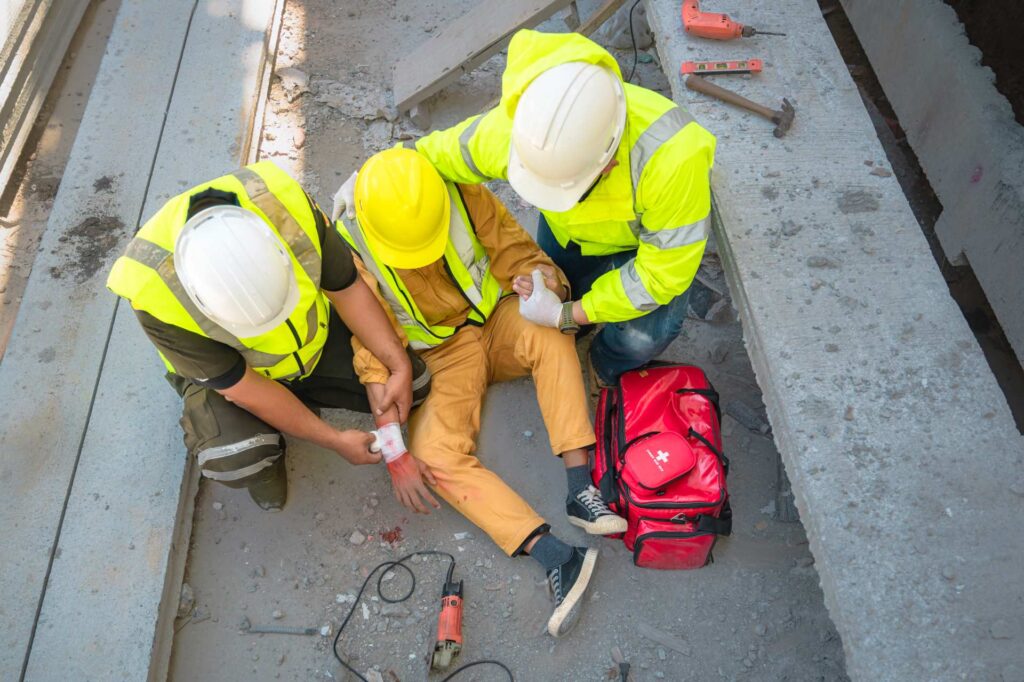


Construction sites are inherently risky environments, and accidents are unfortunately common. When an accident occurs, understanding the legal avenues for seeking compensation can be complex. This guide explores the nuances of construction accident claims, shedding light on the differences between workers’ compensation and personal injury claims.
At Ryan Orsatti Law, our unwavering commitment to personal injury and accident claims ensures you receive the expert guidance needed in challenging situations. We understand the complexities and challenges you face when dealing with the aftermath of a construction accident, and our team is dedicated to protecting your rights and pursuing the compensation you deserve.
With a wealth of experience in San Antonio, TX, and the surrounding areas, we’re here to provide the tailored support you need, leaving no question unanswered and no detail unexamined. We are your partners in seeking justice and relief in the aftermath of personal injury, and your well-being is our top priority. Call us today for the support and advocacy you deserve.
Understanding Workers' Compensation
Workers’ compensation is a system designed to provide financial benefits to employees who are injured on the job. It serves as a no-fault insurance program, meaning that regardless of who is at fault for the accident, injured workers can typically receive compensation.
Benefits and Limitations
While workers’ compensation offers important benefits such as covering medical expenses and a portion of lost wages, it has limitations. It may not fully compensate for pain and suffering or other non-economic damages. Additionally, it generally prohibits injured workers from suing their employers for negligence.
Who Is Eligible for Workers’ Compensation?
Most employees in the construction industry are eligible for workers’ compensation benefits, including construction laborers, carpenters, and electricians. Independent contractors may not be covered, highlighting the importance of clarifying your employment status.
Pursuing Compensation Through Workers' Compensation
To seek compensation through workers’ compensation, injured construction workers need to report the accident promptly and follow the established claims process. This typically involves notifying your employer and filing the necessary paperwork.
Workers’ compensation provides crucial benefits to injured construction workers. These benefits include coverage for medical treatment, disability benefits, vocational rehabilitation, and, in unfortunate cases, death benefits for surviving family members.
The Personal Injury Claim Option
While workers’ compensation is the standard avenue for compensation after a workplace accident, there are situations where a personal injury claim may be appropriate. This includes cases where a third party, such as a negligent subcontractor or product manufacturer, contributed to the accident.
Personal injury claims offer distinct advantages. Unlike workers’ compensation, they allow injured parties to seek full compensation for all damages, including economic and non-economic losses like pain and suffering. Additionally, personal injury claims can be filed against negligent third parties, potentially resulting in higher compensation.Legal Representation
Navigating the complexities of construction accident claims, whether through workers’ compensation or personal injury, can be daunting. Legal assistance is essential to ensure your rights are protected, and you receive fair compensation. An experienced construction site accident lawyer can provide invaluable guidance.
Differences Between Workers' Compensation and Personal Injury Claims
Workers’ compensation and personal injury claims are two distinct legal processes that involve compensation for injuries, but they operate differently and cover different types of situations. Here are some key differences between the two in the context of San Antonio, TX:
Coverage and Eligibility
Workers’ Compensation Claim: This system provides benefits to employees who suffer work-related injuries or illnesses, regardless of fault. In Texas, it is not mandatory for employers to carry workers’ compensation insurance, but many do. Those who are covered can receive benefits such as medical treatment, income replacement, and vocational rehabilitation.
Personal Injury Claim: Personal injury claims can be filed when an individual suffers harm due to the negligence or intentional actions of another party. These claims can arise from various situations such as car accidents, slips and falls, or defective products.
Proof of Fault
Workers’ Compensation Claim: Employees do not need to prove fault in order to receive benefits. As long as the injury or illness is work-related, the employee can typically receive compensation.
Personal Injury Claim: Claimants must prove that the defendant’s negligence or intentional actions caused their injuries. This often involves demonstrating that the defendant had a duty of care, breached that duty, and directly caused the plaintiff’s injuries.
Damages
Workers’ Compensation Claim: Workers’ compensation generally covers medical expenses and a portion of lost wages. It does not typically cover pain and suffering or punitive damages.
Personal Injury Claim: Damages in personal injury claims can include medical expenses, lost wages, loss of earning capacity, property damage, pain and suffering, and in some cases, punitive damages meant to punish the defendant for particularly egregious conduct.
Litigation Process
Workers’ Compensation Claim: Claims are typically handled outside of the court system through the Texas Department of Insurance, Division of Workers’ Compensation. The process is often more straightforward and less adversarial compared to personal injury lawsuits.
Personal Injury Claim: These claims are generally resolved through negotiation, mediation, or a trial if a settlement cannot be reached. They can be complex and involve a more extended legal process, including discovery, depositions, and court proceedings.
Statute of Limitations
Workers’ Compensation Claim: There is a limited time frame within which an injured worker must report the injury to their employer to be eligible for benefits. Failure to do so within the specified period might result in a loss of the right to compensation.
Personal Injury Claim: In Texas, the statute of limitations for most personal injury claims is two years from the date of the injury. It is crucial to file the claim within this time frame, as failing to do so may result in the claim being time-barred.
Understanding these differences is crucial for individuals involved in either workers’ compensation claims or personal injury lawsuits in San Antonio, TX, as it affects the type of compensation they may receive and the legal processes they must navigate. It is always advisable to consult with an experienced attorney who specializes in either workers’ compensation or personal injury law to ensure proper guidance and representation throughout the legal proceedings.
The Importance of Medical Records
Comprehensive medical records play a crucial role in personal injury cases. They document the extent of your injuries, the necessary treatments, and their impact on your daily life.
Medical records significantly influence the compensation amount you may receive in a personal injury or construction accident claim. They provide concrete evidence of the damages you’ve suffered and the ongoing care you may require.
Take Action Today for the Compensation You Deserve!
Send A Message
Workers' Compensation vs. Personal Injury Claims for Construction Accidents


